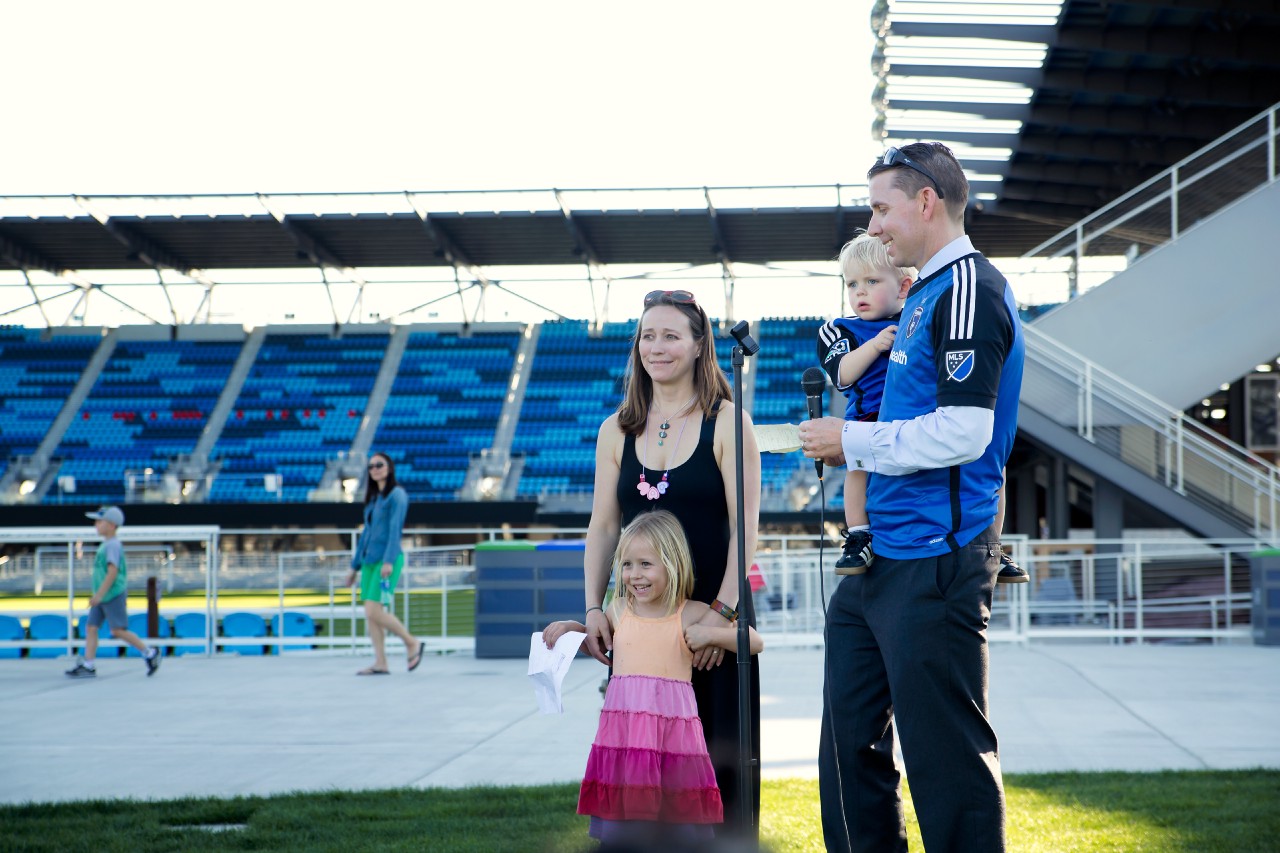
Just days before the San Jose Earthquakes hosted the Portland Timbers on March 13th, 2016, Eliza Sheckley was nearing her goal of 600 girl scout cookie boxes sold. Several players stopped and took some time after practice to buy a few boxes and also chat a bit with Eliza and her father Chris. Regulars at Avaya and Buck Shaw Stadium, “Eliza and Chris were always at the walkway to greet and high five the players at half-time,” Eliza’s mother Tanya said, “Many of them knew her.”
Eliza had cerebral palsy, a condition that prevents movement in children from a young age. “She could not walk or talk,” Tanya explained, “but one look into her eyes and you knew that she understood and followed everything that was happening.” Nothing set back Eliza from achieving her goals and keeping pace with her peers. By selling her final seven boxes, reaching 600 in total, Eliza did what every girl scout wanted to do — win herself an overnight party at Levis Stadium with her friends.
Father Chris Sheckley was planning on writing to the Earthquakes to let them know that Eliza had reached her goal, but the unthinkable had happened. Eliza passed away on March 11th, 2016 in her sleep.
“Dave Kaval’s immediate response was of support and caring and he offered to have a moment of silence before the game,” said Eliza’s mother. The moment of silence was seen around the world, as the club asked Fox Sports to go live a few minutes early. The Earthquakes also offered several club level tickets for Eliza’s family and friends to share the moment. “Chris and I could think of no place that Eliza liked going to more than Avaya Stadium,” Tanya continued.
Four days after her passing, the Earthquakes Foundation helped host Eliza’s Celebration of Life. Along with face painters, craft tables, inflatables, an ice cream food truck for the kids, as well as plenty of food and drinks at the bar, the Quakes also provided their own staff for the event and set up, set up a giant flower display at the entrance, and decorated the stadium with pictures of Eliza and more flowers. “They donated a keg of beer and had tickets printed with her name and a clip of a song from the Ultras,” Tanya said, “Still singing for you in the sky.” It was the perfect way to honor Eliza. “Wondo gave me his game worn shirt after the game as a tribute to Eliza’s memory,” Tanya’s husband Chris added, former San Jose Earthquakes striker “Alan Gordon also arranged to get us Chris Klein’s [LA Galaxy President] tickets for the Quakes game at StubHub Center.”
“They did all of this graciously, without hesitation and really made us feel supported and loved by the organization. They truly are devoted to their fans and we can not say enough about the kindness they have shown us,” Tanya said of the Earthquakes.

Inspired by Eliza, Tanya and Chris have now founded UP Academy, a school that seeks to become the first in the world to have a fully integrated neuro-development program in addition to project based curriculum in an inclusive setting. “Our mission is to produce successful, independent children capable of reaching their ultimate potential,” Tanya included, “Our neurodevelopment program will transform inclusive education with an integrated therapeutic method that views both life skills and academic achievement with equal value.”
“Eliza was very curious and observant. She loved everyone and would always be excited to see a guest or a friend. She would have physical therapy for two hours before school, go to a full day of school and then have speech or occupational therapy after school. Despite being tired and having all of the academic demands of a typical child, she would work hard and always try her best,” Tanya added, “She was the most tenacious and resilient kid I have ever known. She never gave up. These things are her legacy, and as we later realized, are also the values we have written for the school: Be Kind, Be Strong and Always Try Your Best.”

After five years of nonstop traveling, researching, and learning everything possible about neuro-plasticity, it was a difficult transition to put Eliza into the school system for Chris and Tanya. “They did not see life skills as ‘educationally necessary’ and would not support or continue the majority of the therapy that she was doing.” Tanya saw this flaw in the current system through her family’s experiences.
“She was not getting the therapy she needed and what she was getting was often not in alignment with the class schedule. It became clear that in public school I had a choice, put her in a special day class where she would not get an academic education but she might get more therapy, or put her in an inclusive class with her peers and she would not get the therapy she needed. It seemed like there should be a way to get both. I researched all over the country and the world, and no where was there an educational method like the one we are planning.”
“We hope to change the lives of millions of children living with physical and communication disabilities through a new educational method and a greater understanding of the strengths that these children posses,” Tanya went on.
To learn more about UP Academy or get in touch with them, visit their website at http://www.upacademysf.org/.




